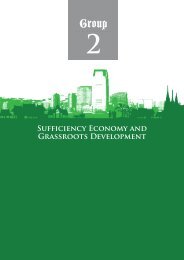Conflict, Legitimacy and Government Reform: Equitable Allocation of ...
Conflict, Legitimacy and Government Reform: Equitable Allocation of ...
Conflict, Legitimacy and Government Reform: Equitable Allocation of ...
You also want an ePaper? Increase the reach of your titles
YUMPU automatically turns print PDFs into web optimized ePapers that Google loves.
some overlap among them. It illustrates that organizations in all sectors exist in a context which is sh<br />
by citizens <strong>and</strong> their traditions, values <strong>and</strong> cultures.<br />
Panel Discussion<br />
Figure 1<br />
�������� ��������<br />
Values<br />
�������� ��������<br />
Figure 1<br />
Governance relationships<br />
Civil<br />
Society<br />
������������������������<br />
Traditions<br />
media<br />
<strong>Government</strong><br />
History<br />
Private<br />
Sector<br />
�������� ��������<br />
Cultures<br />
�������� ��������<br />
In principle, the concept <strong>of</strong> governance may be applied to any form<br />
<strong>of</strong> collective action.Governance is about the more strategic aspects <strong>of</strong><br />
steering: the larger decisions about direction <strong>and</strong> roles. That is,<br />
governance is not only about where to go, but also about who should be<br />
capacity. There are four areas or zones where the concept is particularly relevant.<br />
involved in deciding, <strong>and</strong> in what capacity. There are four areas or zones<br />
where the concept is particularly relevant.<br />
In principle, the concept <strong>of</strong> governance may be applied to any form <strong>of</strong> collective action.Governance<br />
about the more strategic aspects <strong>of</strong> steering: the larger decisions about direction <strong>and</strong> roles. That is,<br />
governance is not only about where to go, but also about who should be involved in deciding, <strong>and</strong> in<br />
� Governance in ‘global space’, or global governance, deals with issues outside the purview <strong>of</strong><br />
individual governments4.<br />
� Governance in ‘national in ‘global space’, space’, i.e. within or global a country: governance, this is sometimes deals understood with as the<br />
issues exclusive outside preserve the <strong>of</strong> purview government, <strong>of</strong> <strong>of</strong> individual which there governments.<br />
may be several levels: national, provincial<br />
state, indigenous, urban or local. However, governance is concerned with how other actors, s<br />
as civil society organizations, may play a role in taking decisions on matters <strong>of</strong> public conce<br />
� Organizational governance (governance in ‘organization space’): this comprises the activitie<br />
organizations that are usually accountable to a board <strong>of</strong> directors. Some will be privately ow<br />
<strong>and</strong> operated, e.g. business corporations. Others may be publicly owned, e.g. hospitals, scho<br />
Governance in ‘national space’, i.e. within a country: this is<br />
sometimes understood as the exclusive preserve <strong>of</strong> government, <strong>of</strong><br />
which there may be several levels: national, provincial or state,<br />
government corporations, etc.<br />
indigenous, urban or local. However, governance is concerned<br />
with how other actors, such as civil society organizations, may<br />
play not be a role a formally in taking constituted decisions governing on matters board. <strong>of</strong> public concern<br />
6<br />
� Community governance (governance in ‘community space’): this includes activities<br />
local level where the organizing body may not assume a legal form <strong>and</strong> where there m<br />
Organizational governance (governance in ‘organization space’):<br />
this comprises the activities <strong>of</strong> organizations that are usually<br />
6 st<br />
John Graham, Bruce Amos <strong>and</strong> Tim Plumptre, “Principles for Good Governance in the 21 Century: Policy B<br />
No. 15”, www.iog.ca/publications<br />
accountable to a board <strong>of</strong> directors. Some will be privately owned<br />
<strong>Equitable</strong> <strong>Allocation</strong> <strong>of</strong> Resources, Governance <strong>and</strong> <strong>Reform</strong>: Introducing IDG-Net<br />
Institute On Governance<br />
93














